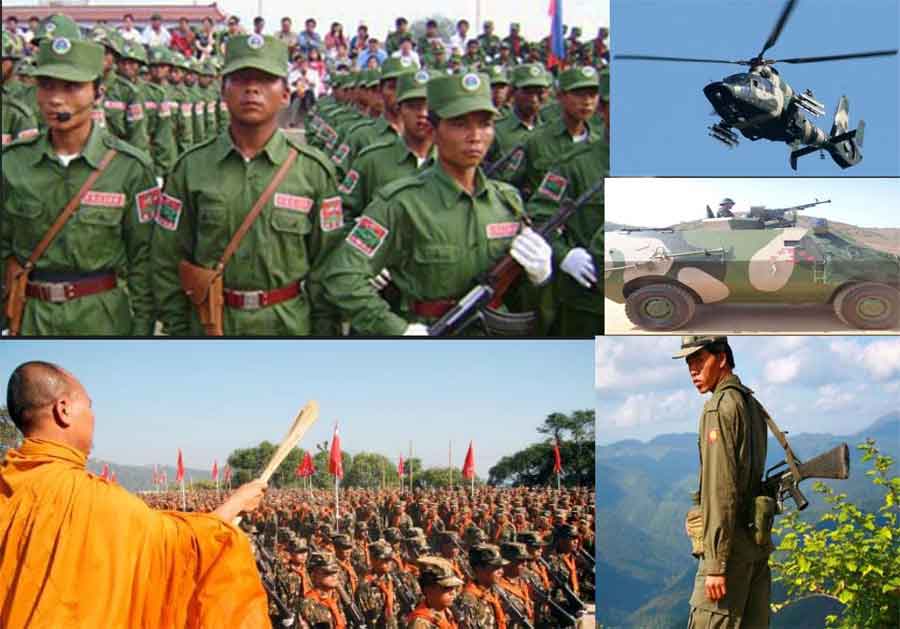Buddhism preaches non-violence but this is the 21st Century and Tibetans need to look around how there compatriot Buddhist are able to preserve their heritage, culture and language. Tibetans also need to pause and look around in their immediate neighbourhood. Myanmar ranks fourth globally in Buddhist population and over the years China has developed strong military and economic relations with Myanmar for her own geopolitical ambitions. Yet China has lethally armed the United State Wa Army (USWA) headquartered in Shan State and controlling the drug triangle with assault rifles, machine guns, rocket launchers, shoulder fired missiles, mechanized vehicles and even missile fitted helicopters, developing USWA as Chinese proxy. The Wa’s are primarily Buddhists. Should they not be part of Tibetan’s strategic depth –to help alleviate sufferings of Tibetans?
China has lethally armed the United State Wa Army (USWA) headquartered in Shan State and controlling the drug triangle with assault rifles, machine guns, rocket launchers, shoulder fired missiles, mechanized vehicles and even missile fitted helicopters, developing USWA as Chinese proxy.
Tibetans had many expectations from the US from the meeting between President Obama and HH Dalai Lama but the meeting was more of a face saver for Obama, as was the appointment of Sarah Sewall as a special coordinator for Tibetan issues by the US, vehemently opposed by China and issue rested thereafter. Ironically, in the present era of irregular forces having demonstrated greater strategic value over conventional and even nuclear forces, even powerful nations like China and the US are using proxy forces and in doing so, human rights get sidelined. Besides, look at the civilian casualties wherever the US-NATO forces have operated with scant regard to collateral damage, besides the state of these countries and regions once these forces vacated. Where ‘boots on ground’ have been replaced with ‘boots by proxy’ presently is all too apparent. Economic ties apart, learning from Spain, the US and the West should do much more for the Tibetan cause.
As for India, India did provide asylum to HH Dalai Lama and many followers but the combination of Pandit Nehru and Krishna Menon, his Defence Minister (both devoid of strategic sense and looking askance at military advice) botched up the Tibetan cause from the very beginning. Former ambassador RS Kalha writes in his recent book ‘The Dynamics of Preventive Diplomacy’ thus, “During the period of the Korean conflict, several ‘neutral’ countries were active in trying to promote peace on the Korean peninsula. One of the countries that was most active was India. Indian diplomats were active both sides, often travelling to Beijing. Moscow and Washington and New York in order to promote a peaceful settlement.
It is said that India did not take the Chinese intervention in Tibet seriously and refused to take up the Tibetan cause in the UN, since it wished to play a greater role on the world stage, particularly in defusing the tension on the Korean peninsula. On November 18, 1950, the US Ambassador at Delhi reported to the US Secretary of State that the then Secretary General of the External Affairs Ministry Sir Girija Shankar Bajpai told him that India wished to delay “action” on the Tibetan demarches to the UN due to its “efforts” in achieving a ceasefire in Korea.
Similarly, the British were informed that the “Timing of the Tibetan appeal needed careful consideration. Korea was obviously first importance ….” Apparently, Nehru’s vision was coloured not only with the Chinese hoodwinking him with the Hindi-Chini Bhai Bhai syndrome but also his ambition for a Nobel Peace Prize that looked closer by giving preference to the Korean Peninsula over the Chinese invasion in Tibet. To top this India also started supplying rice to the PLA terrorizing the Tibetans in TAR. Not that India does not continue to suffer with this legacy of lack of strategic vision and the military continuously sidelined from strategic and security related decision making; kowtowing to China’s belligerence and losing chunks of territory. This is unlikely to change till India has a strong government.






The Chinese empire has reached its peak-From henceforth,it has to go the downhill way..All Empires reach their peak at some time or the other & ultimately decline,decay,implode & finally disintegrate-like the Erstwhile Soviet Union did in a span of less than 80 years.[ All the ” Kings Horses & men {like Putin } have not been able to put the Humpty Dumpty Empire together again.].. History is a harsh Judge & Historians & Posterity are unlikely to rate the Achievements of the Chinese empire on Par with other Great Empires like The Ancient Greeks & British Empire !!..India & All Asia needs to be on Guard against this Evil Chinese empire-They have mastered the art & Science of Ambiguity,Double speak,Deception & Aggressiveness in the pursuit of their Ends.
this is not fair that china grab the tibet. it is independent state so china has no right
to press tibet . USA, Russia ,uk ,france, germany ,india ,japan and power of world has to take responsilbility to make effort to free tibet from china rule and china is threat to whole Asia and the world so it should be prevent ed and closely watch all activity. and india should be prepare for next war with china, because china not trustable nabour.